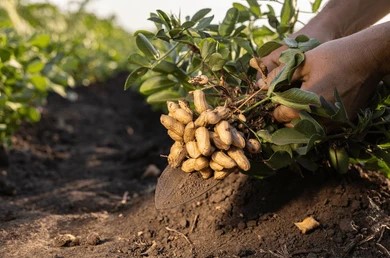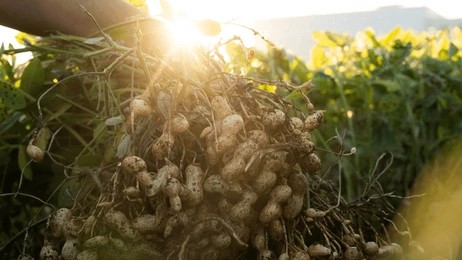A Comprehensive Guide to Profitable Peanut Farming in Nigeria

Peanut farming, also known as groundnut cultivation, is a thriving agricultural practice in Nigeria. As one of the leading producers of peanuts in Africa, Nigeria provides vast opportunities for farmers, investors, and agribusiness entrepreneurs to generate significant income. This guide explores everything you need to know about peanut farming in Nigeria, including step-by-step cultivation, profitability, market visibility, and income potential.
Step-by-Step Guide to Peanut Farming in Nigeria
1. Understanding Peanut Farming
Peanuts (Arachis hypogaea) are a leguminous crop widely grown in northern Nigeria. They are a major source of food, oil, and livestock feed, making them a high-demand product in local and international markets. The plant thrives in warm climates with moderate rainfall and well-drained soil, making Nigeria an ideal environment for peanut farming.
2. Choosing the Right Variety
There are different peanut varieties grown in Nigeria, including:
- Spanish Peanuts – Small kernels with a high oil content.
- Virginia Peanuts – Larger kernels, used for roasting.
- Runner Peanuts – Ideal for peanut butter production.
- Valencia Peanuts – Sweet-flavored and often consumed raw. Choosing the right variety depends on your target market and environmental conditions. It is advisable to conduct soil and climate assessments to determine the best peanut variety for your farm.
3. Land Preparation
- Select well-drained, sandy loam soil with a pH of 5.5-7.0.
- Clear the land of weeds, stumps, and debris.
- Plow and harrow the land for proper aeration.
- Apply organic manure or fertilizers like NPK 15:15:15 for better yields.
- Ensure proper crop rotation to prevent soil nutrient depletion and reduce pest infestations.
4. Seed Selection and Planting
- Use certified seeds with a high germination rate.
- Plant at a spacing of 20-30 cm between plants and 50-60 cm between rows.
- Planting should be done at the beginning of the rainy season (April – June).
- Ensure seeds are treated with fungicides to protect against fungal diseases.
- Proper seed inoculation can enhance nitrogen fixation, leading to healthier crops and higher yields.
5. Weed and Pest Management
- Weed manually or apply herbicides to prevent competition for nutrients.
- Control common pests such as aphids, termites, and thrips using organic or chemical pesticides.
- Prevent fungal diseases by applying fungicides where necessary.
- Intercropping with crops like maize and millet can help reduce pest attacks.
6. Irrigation and Fertilization
- While peanuts thrive in rain-fed conditions, irrigation boosts yield in dry areas.
- Apply calcium-rich fertilizers during the flowering stage for healthy pod formation.
- Use compost and organic fertilizers to improve soil health.
- Drip irrigation is recommended for efficient water use, especially in arid regions.
7. Harvesting and Post-Harvest Handling
- Harvest 90-120 days after planting, when leaves turn yellow and pods harden.
- Dry the harvested peanuts under the sun for 2-3 weeks.
- Store in well-ventilated conditions to prevent aflatoxin contamination.
- Shell peanuts carefully to avoid breakage and maintain quality.
- Sort and grade peanuts based on size and quality for better market pricing.
Review: Is Peanut Farming Profitable in Nigeria?
Peanut farming in Nigeria is highly profitable due to the following reasons:

A Comprehensive Guide to Profitable Peanut Farming in Nigeria
- High Demand – Groundnuts are widely consumed and used for oil extraction, peanut butter, and livestock feed.
- Favorable Climate – Nigeria’s climate is suitable for peanut farming, reducing production risks.
- Affordable Inputs – Seeds, fertilizers, and labor costs are relatively low compared to other cash crops.
- Multiple Income Streams – Farmers can sell raw peanuts, processed peanut products, or peanut oil.
- Short Growth Cycle – Peanuts mature within 3-4 months, allowing multiple harvests per year.
Potential Risks:
- Price fluctuations in the market.
- Pest and disease outbreaks.
- Poor storage leading to aflatoxin contamination.
- Climate change affecting rainfall patterns.
- Limited access to modern farming equipment and techniques.
Market Visibility and Income Potential
1. Where to Sell Peanuts in Nigeria
- Local Markets – Sell raw or roasted peanuts in major markets.
- Processing Industries – Supply to oil mills and peanut butter manufacturers.
- Export Markets – Nigeria exports groundnuts to countries like India, China, and the EU.
- Online Sales – Utilize e-commerce platforms like TMO, Jiji, Konga, and Facebook Marketplace.
- Agro-Cooperatives – Join cooperatives to gain access to bulk buyers and better pricing.
2. How Much Can You Earn from Peanut Farming?
| Farm Size | Estimated Yield (kg) | Potential Revenue (NGN) |
|---|---|---|
| 1 Acre | 1,200 – 1,500 | ₦600,000 – ₦900,000 |
| 5 Acres | 6,000 – 7,500 | ₦3,000,000 – ₦4,500,000 |
| 10 Acres | 12,000 – 15,000 | ₦6,000,000 – ₦9,000,000 |
(Assuming ₦500 per kg of peanuts at market price)
Conclusion
Peanut farming in Nigeria presents an exciting opportunity for farmers and agribusiness investors. By following proper farming practices, leveraging marketing channels, and ensuring quality control, you can build a highly profitable peanut farming business. Whether you are a beginner or an experienced farmer, peanut farming remains a golden investment with great returns.
To further increase profitability, farmers should consider value addition, such as processing peanuts into peanut butter, peanut oil, and snacks. Government programs and agricultural support initiatives can also help farmers improve productivity and gain access to export markets. With the right strategies and commitment, peanut farming can become a sustainable and lucrative venture for Nigerian farmers.

Leave your comment